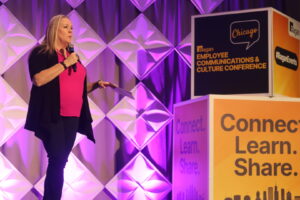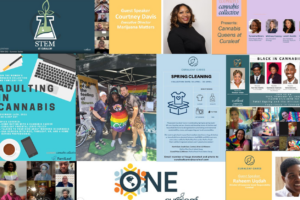How a societal response team can engage employees around your purpose
Forming an internal societal response committee to tell your story can instill meaning and purpose across your organization.

Cheryl Fields Tyler, founder, and CEO of Blue Beyond Consulting is passionate about the workplace. Her own life’s work has focused on instilling meaning and purpose in organizations.
She believes that doing so results in lower turnover and greater marketplace success. This includes leadership taking a stand on issues that matter to their workforce — which cements workers’ trust and loyalty.
Fields Tyler is currently working with a Fortune 500 to establish a clear framework for societal issue response.
“Given how the world has changed, this company knows they need to think differently,” she says. “Putting their moral capital to work in line with their purpose, values, and causes is essential.”
Citing the 2022 Edelman Trust Barometer, she notes that societal leadership is now considered a core function of the business. People have put their trust in business,and they want more leadership on societal issues.
Instilling meaning and purpose
Ben & Jerry’s is an early example of a company on this trajectory..
The ice cream company became of the first activist businesses to support voting rights, LGBTQ+ rights, climate justice, and other causes that mattered to its founders. Today, this trend of brands taking a stand by infusing their values into their messaging is more commonplace often includes brands engaging with the Black Lives Matter movement, reproductive rights organizations and environmental causes. Fields Tyler instructs organizations on how to create their own programs.
The Fortune 500 company Fields Tyler recently worked with developed a small team, which was led by the company’s chief people officer (CPO), diversity equity and inclusion team (DEI) along with leaders in communications, culture, legal, and investor relations. The team determined if, how and when to respond to societal issues.
This started, she says, with educating the leadership, employees, and board on why and how to invest their moral capital. It involved
- Reaffirming the values for which they stand
- Setting expectations and processes about how societal issues stand will be socialized with leadership. and communicated internally and externally
- Understanding and preparing for all the potential risks and blowback.
Fields Tyler posed a number of key questions that similar societal-response committees to consider, including:
1) Does the issue provide an opportunity to take a meaningful and impactful stand in alignment with company values?
2) What is the bottom line cost to company culture for not taking a stand?
3) How might this stand drive changes in our policies, philanthropic efforts, or community relationships?
4) What are the risks and opportunities of taking a stand versus staying silent?
5) Are there business and legal risks we need to understand and mitigate?
The work of societal response
Fields Tyler suggests a multi-step process for a societal response team:
- Core team members anticipate and proactively raise potential issues to address (or readdress, reaffirm)
- Adjunct team members will support and consult, as requested
- The recommendation is taken to CEO and a course of action is agreed upon
- CEO confers with the leadership team or board
- Business / HR leaders notified in advance of employee communication
Telling the story
Leadership sets the tone for organizational values but to make it real — they need to talk about it. This means telling their own stories and explaining what they find meaningful. In addition to the development of the societal response plan, they must create storytelling moments by keeping it personal.
“You have to be good people doing good things. People smell if you are not being authentic,” Fields Tyler said. She explained an instance in which a group of employees did wonderful things for the Ukrainian population yet these things were not publicized internally. This means telling the truth when we show up and also being real and explaining when we are not at our best.
Internal comms professionals are at the helm and poised to become more essential.
“I truly feel there has never been a better time to do internal comms—it is a meaty and meaningful time,” said Fields Tyler.“You can’t do anything without effective internal communications.”
Jennifer Mooney is an award-winning communications expert. Her senior management tenure includes the former Time Warner, ad agency communications teams, and consulting with diverse clients. She holds an undergraduate degree in Journalism (Albion College) and an MA in Industrial-Organizational Psychology (Union Institute). She is the co-author of Hope Interrupted; America Lost and Found in Letters—a book and podcast. (Orange Frazer Press- 2021)www.hopeinterrupted.com






